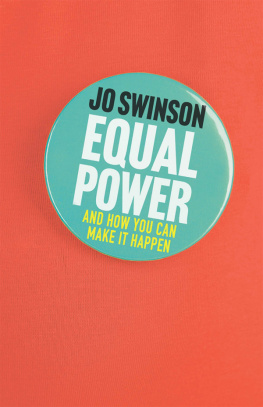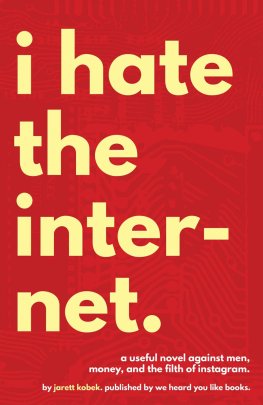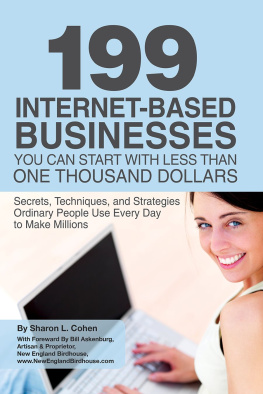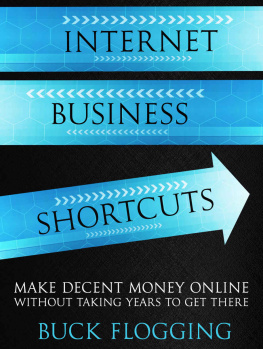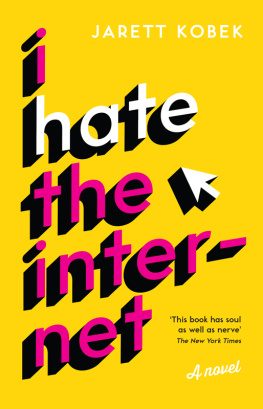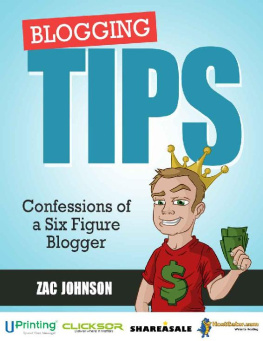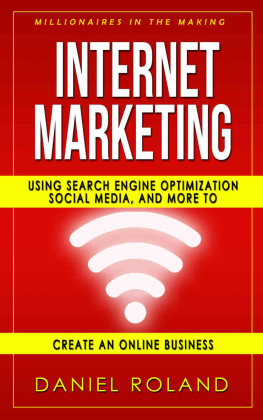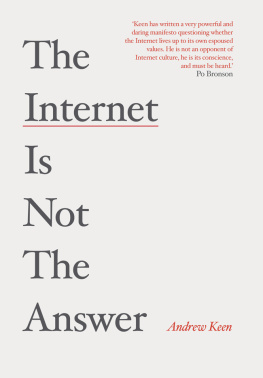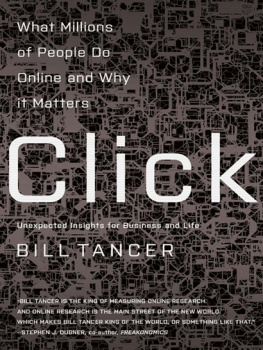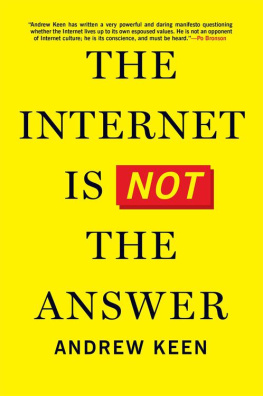Contents
Guide


First published in Great Britain in 2018 by Atlantic Books, an imprint of Atlantic Books Ltd.
Copyright Jo Swinson, 2018
The moral right of Jo Swinson to be identified as the author of this work has been asserted by her in accordance with the Copyright, Designs and Patents Act of 1988.
All rights reserved. No part of this publication may be reproduced, stored in a retrieval system, or transmitted in any form or by any means, electronic, mechanical, photocopying, recording, or otherwise, without the prior permission of both the copyright owner and the above publisher of this book.
10 9 8 7 6 5 4 3 2 1
A CIP catalogue record for this book is available from the British Library.
The extract from Desert Flower by Waris Dirie (Virago, 2001) is reproduced by kind permission of Virago, an imprint of Little, Brown Book Group.
Every effort has been made to trace or contact all copyright holders. The publishers will be pleased to make good any omissions or rectify any mistakes brought to their attention at the earliest opportunity.
Hardback ISBN 978 1 78649 187 9
E-book ISBN 978 1 78649 188 6
Printed in Great Britain
Atlantic Books
An Imprint of Atlantic Books Ltd
Ormond House
2627 Boswell Street
London
WC1N 3JZ
www.atlantic-books.co.uk
For Dad, who taught me the power of asking questions
For Mum, who showed me the strength that lies within
Contents
Introduction
Youd have thought Id have figured it out before. After all, I had been a Member of Parliament for a decade, and Minister for Women for more than two years. But every time I made a comment on gender equality, only to find my words twisted wildly out of context by newspaper stories the next day, I assumed that it was my fault, that somehow Id got it wrong. I hadnt been careful enough with my choice of language, or my meaning must have been unclear. Then it finally dawned that this media response was an inevitable part of the same endemic problem.
Gender inequality is everywhere. It is ingrained throughout society, in each and every one of us. We are all sexist, and so are our institutions and power structures. Thats why attempts to challenge it are often met with such ridicule and resistance. There is no perfect form of words to express ideas of gender equality that will not be deliberately misunderstood by those who feel threatened by the prospect. So theres no point worrying about the shrieks of outrage from outlets that are committed to preserving the status quo of power inequality where power is hoarded and concentrated in the hands of rich white men.
(Daily Mail, eat your heart out, I cant wait for your hot take on Equal Power.)
What I have learned about gender power in society is what I want to share with you in this book. Most of all, I want you to feel encouraged, empowered and emboldened to take action that will challenge gender inequality. Each chapter includes lots of ideas for things you can do, from having a conversation differently to campaigning for major change. When something resonates, or you come across something youd like to do, please jot it down, and make a promise to yourself to try it out. Were all part of the problem to varying degrees but equally, we can all be part of the solution.
Invisible, Unintentional, Universal
As a minister with a significant portfolio in the Department for Business, Innovation and Skills spanning corporate governance, employment law, competition policy, consumer affairs and the Post Office, my responsibility for Women and Equalities had to be fitted into about a fifth of my ministerial time (and this position had been tellingly forgotten in the 2012 reshuffle, so was not allocated to me until several days later). Id initially viewed the equalities portfolio much like my other areas of responsibility, yet it was the most intractable and biggest of problems to address and not only because of the difficulties of winning battles against Conservative members of the coalition government. The Department for Business had a budget of 26 billion, and 800 civil servants in one building alone, with thousands more across partner agencies. The Government Equalities Office had less than 20 million, and only narrowly avoided a further 6 million cut when I enlisted help from the Chief Secretary to the Treasury, my Liberal Democrat colleague Danny Alexander. Its 100 staff were cut to 50, and it featured low down in the official government pecking order.
But even with far greater resources, government alone is not going to solve the problem of gender inequality, because it is often invisible, unintentional and universal.
Celebrating the milestones in equality for women is important such as the centenary of the first UK women achieving the right to vote in elections in 1918. But benchmarking against history can lead us into a false comfort about progress, instead of seeing the huge gulf that still exists and focusing on what we need to do to close it. A century on from women in the UK winning the right to vote, nowhere in the world has gender equality been achieved.
When I was 13, my school organised a day-long conference called You Can Do Anything for all the girls in my year group. People who worked in a range of different jobs came and spoke about what they did and answered questions from the teenage audience a firefighter, a scientist, a police officer, a salesperson, a council worker. This careers event was timed to broaden our horizons and inform our looming subject choices. While in subsequent years it was open to both boys and girls, it was clear that even in the early 1990s, people were trying to figure out why women were largely missing from some careers and what they could do to change it.
If youd asked me, Id have said I thought I could do anything. At the time I wanted to be an author; later on, inspired by Young Enterprise, I decided I wanted to go into business. My grandfather always said he thought I would be a politician. Throughout my 1980s childhood, it didnt cross my mind that it was unusual for a woman to be prime minister the very act of being the first woman to lead the UK government is one of Margaret Thatchers most powerful legacies, and it is too often dismissed in an understandable rage about the policies she advanced. Whatever you think of Theresa Mays politics and judgement, girls growing up today take as read that a woman can run the country. But while symbolism and role models matter, even with a woman at the top, the corridors of power are stuffed with men.
When I arrived in Parliament as its youngest member in 2005, a fresh-faced 25-year-old full of anticipation, Id have told you I didnt experience sexism. I expected the world to treat me on the same basis it would a man, and on the face of it, in the main, it appeared to do so. I didnt see the covert closed circles of men making the decisions, and they didnt see or think it mattered that they were all predominantly white men. When my husband Duncan was elected as an MP in 2010, the comparison between the experience of a man and of a woman as an MP was impossible to avoid. The lived experience of Parliament, of media scrutiny, the instinctive approach to situations, the acceptance into the club all differed greatly.

